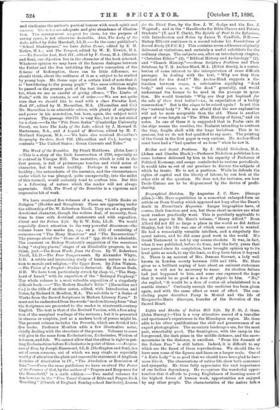The Wood of the Brambles. By Frank Matthews. (John Lane.)
—This is a story of the Irish Insurrection of 1798, especially 83 it centred in Vinegar Hill. The narrative, whioh is told in the first person, is full of picturesque touches and vivid notes of character, but it wants lucidity. Perhaps it was meant to lucidity ; the antecedents of the narrator, and the circumstances under which he was plunged, quite unexpectedly, into the midst of this turmoil, would certainly tend to confuse him. But this is a following of nature which the reader will not always appreciate. Still, The Wood of the Brambles is a vigorous and impressive bit of work.
We have received five volumes of a series, "Little Books on Religion" (Hodder and Stoughton). These are appearing under the editorship of Dr. W. Robertson Nicoll. They are of a generally devotional character, though the writers deal, of necessity, from time to time with doctrinal statements and with exposition. Christ and the Future Life. By R. W. Dale, LL.D. We would especially direct attention to the very powerful discourses—the volume bears the marks (as, e.g., on p. 151) of consisting of .sermons,—on "The Many Mansions" and "The Resurrection." The passage about the "Home of God" (pp. 36-41) is admirable. The comment on Bishop Westcott's suggestion of the mansiones being "staying places," stages of an illimitable progress, is, we think, just.—The Seven Words from the Cross. By W. Robertson Nicoll, LLD.—The Four Temperaments. By Alexander Whyte, D.D. A subtle and interesting study of human nature in rela- tion to morals and religion.—The Upper Room. By John Watson. —.The Vision of a Prophet : Studies in Zechariah. By Marcus Dods, D.D. We have been particularly struck by chap. vi.," The Shep- herd of Israel," with its exposition of the "Betrayal Prophecy." Yee whole volume is a most valuable exposition of a singularly difficult book.—" The Modern Reader's Bible" (Macmillan and 'Co.) is the title of another series, edited, with Introduction and Notes, by Richard G. Moulton, MA. The sub-title is "A Series of Works from the Sacred Scriptures in Modern Literary Form." It must not be understood from the words " modern literary form "that the Scriptures are presented to the reader in nineteenth-century English. The text is that of the Revised Version, with a free adop tion of the marginal readings of the revisers ; but it is presented in stanzas or couplets, just as a modern book of poems might be. The present volume includes the Proverbs, which are divided into five books. Professor Moulton adds a few illustrative notes, chiefly dealing with the structure of the poems. Volumes to come will give in the same form Ecclesiasticus, Ecclesiastes, Wisdom of Solomon, and Job. We cannot allow that the editor is right in put- ting Ecclesiasticus before Ecclesiastes in point of time.—Forgive- ness of Sins, by Joseph Hammond, LL.B. (Skeffington and Son), is a set of seven sermons, out of which we may single as especially worthy of attention the plain and reasonable statement of Anglican doctrine of Absolution in IV., "The Absolution or Remission of Sins."—From the same publishers we have received The Power of the Presence of God, by the author of "Prayers and Responses for the Household," in a sixth edition.—Two useful volumes for teachers are in the "Five Years' Coarse of Bible and Prayer-Book 'reaching" (Church of England Sunday-school Institute), Lessons for the Third Year, by the Rev. J. W. Gedge and the Rev. J. Wagstaff; and in the "Handbooks for Bible Classes and Private Students" (T. and T. Clark), The Epistle of Paul to the Ephesians, with Introduction and Notes by James T. Candlish, DD.— Bishop Ellicott continues in a second volume his Foundations of Sacred Study (S.P.C.K.) This contains seven addresses originally delivered at visitations, and certainly a useful substitute for the ordinary charge. The subjects are, after an introductory chapter, "Christian Ethics" (3), "Biblical History and Archmology " (2), and "Church History."—Some Scripture Problems and Their Solutions, by T. H. Archer-Hind, M.A. (Elliot Stock), is a contri- bution of some interest to the interpretation of some difficult passages. In dealing with the text, "Why are they then baptised for the dead ? " Mr. Archer-Hind suggests a dis- tinction between vewpos, a substantive signifying "dead body," and 141cpos, a, or, "the dead" generally, and would understand the former to be used in the passage in ques- tion. He would translate "Why are they yet baptised for the sake of their dead bodies?—i.e., in expectation of a bodily resurrection." But is the vIttpos to be raised again ? Is not this the "natural body " ? We are afraid that the new explanation will not be more acceptable than the old. There is another paper of some length on "The Bible History of Satan," and six notes. In one of these it is suggested that in Psalm cxiv. 26 the ships means the nautilus, the Psalmist intending to contrast the tiny, fragile shell with the huge leviathan. This is in- genious, but we do not feel qualified to say more. The printing of the Greek in the first paper is very curious. Mr. Archer-Hind must have bad a "bad quarter of an hour" when he saw it.






































 Previous page
Previous page